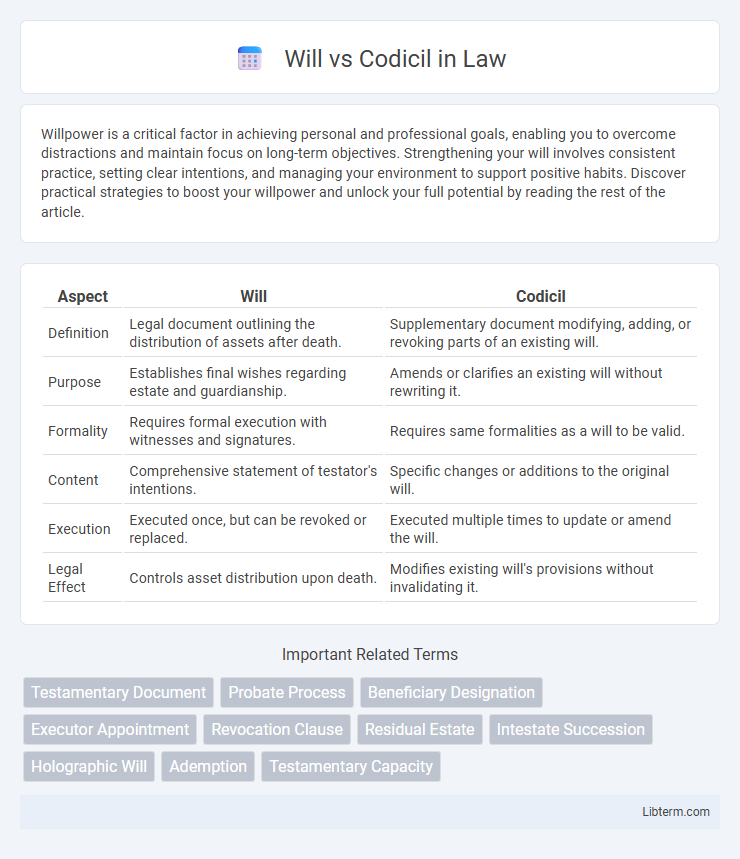Willpower is a critical factor in achieving personal and professional goals, enabling you to overcome distractions and maintain focus on long-term objectives. Strengthening your will involves consistent practice, setting clear intentions, and managing your environment to support positive habits. Discover practical strategies to boost your willpower and unlock your full potential by reading the rest of the article.
Table of Comparison
| Aspect | Will | Codicil |
|---|---|---|
| Definition | Legal document outlining the distribution of assets after death. | Supplementary document modifying, adding, or revoking parts of an existing will. |
| Purpose | Establishes final wishes regarding estate and guardianship. | Amends or clarifies an existing will without rewriting it. |
| Formality | Requires formal execution with witnesses and signatures. | Requires same formalities as a will to be valid. |
| Content | Comprehensive statement of testator's intentions. | Specific changes or additions to the original will. |
| Execution | Executed once, but can be revoked or replaced. | Executed multiple times to update or amend the will. |
| Legal Effect | Controls asset distribution upon death. | Modifies existing will's provisions without invalidating it. |
Understanding Wills: Definition and Purpose
A will is a legal document that outlines an individual's wishes regarding the distribution of their assets and the guardianship of any minor children after death. A codicil serves as an amendment or addition to an existing will, allowing changes without the need to create a new will entirely. Understanding these distinctions is essential for effective estate planning and ensuring that one's final wishes are accurately reflected and legally binding.
What is a Codicil?
A codicil is a legal document that modifies, clarifies, or revokes specific provisions of an existing will without replacing the entire document. It must be executed with the same legal formalities as the original will, including proper witnessing and signing. Codicils provide a convenient way to update a will to reflect changes in circumstances or wishes without drafting a new will.
Key Differences Between a Will and a Codicil
A will is a comprehensive legal document that outlines the distribution of assets and guardianship after death, whereas a codicil serves as an amendment or addition to an existing will. Wills establish the primary testamentary intentions, while codicils modify, explain, or revoke specific provisions without replacing the original will. The validity of both requires proper execution formalities, but codicils depend on the original will's existence and cannot stand alone.
When Should You Use a Will?
A will should be used when you want to provide clear instructions for distributing your assets, naming guardians for minor children, and appointing an executor to manage your estate after death. It is essential for anyone with significant property, debts, or dependents, ensuring your wishes are legally documented and enforceable. Using a will also helps avoid intestate succession, which occurs when someone dies without a valid will, potentially leading to disputes and delays.
When Is a Codicil Appropriate?
A codicil is appropriate when minor changes or additions are needed to an existing will without creating an entirely new document, allowing for updates such as naming new beneficiaries, altering executors, or modifying specific bequests. It must be executed with the same formalities as the original will to ensure legal validity and prevent potential disputes. Using a codicil avoids revoking the original will but can complicate the estate plan if multiple codicils accumulate over time.
Legal Requirements for Valid Wills
A valid will must be in writing, signed by the testator, and witnessed by at least two competent individuals according to most legal jurisdictions. A codicil, which serves as an amendment to an existing will, must meet the same legal formalities to be enforceable. Both documents require clear testamentary intent and mental capacity of the testator to ensure legal validity.
Legal Requirements for Valid Codicils
A codicil must meet specific legal requirements to be valid, including being in writing, signed by the testator, and witnessed by the same number of witnesses required for a will, commonly two. It serves as an amendment to an existing will without revoking the entire document, provided it satisfies formalities like intent and execution under applicable state laws. Courts often scrutinize codicils closely to ensure they clearly express the testator's intent and conform to statutory regulations governing testamentary changes.
Common Mistakes with Wills and Codicils
Common mistakes with wills often include failing to update the document after major life changes, leading to outdated provisions that do not reflect the testator's current intentions. Codicils, intended to amend wills, can be problematic if they are not executed with the same legal formalities, risking invalidation and unintended consequences. Overlooking the requirement for witness signatures on both wills and codicils frequently results in disputes during probate.
Choosing Between a New Will and a Codicil
Choosing between a new will and a codicil depends on the extent of changes needed in the original will; a codicil is suitable for minor amendments such as updating beneficiary details or adding specific bequests, while a new will is ideal for comprehensive revisions including altering executors or restructuring asset distribution. Legal validity requires that both wills and codicils meet formal execution standards, often involving witnesses and notarization to prevent contestation. Evaluating the complexity of changes and consultation with an estate attorney ensures that the chosen document accurately reflects the testator's intentions and adheres to current laws.
Updating Your Estate Plan: Best Practices
Updating your estate plan regularly ensures your will accurately reflects your current wishes and life circumstances. A codicil serves as a legal amendment to a will, allowing specific changes without rewriting the entire document. Best practices include reviewing your estate plan after major life events and consulting an estate attorney to properly execute codicils or update your will.
Will Infographic

 libterm.com
libterm.com